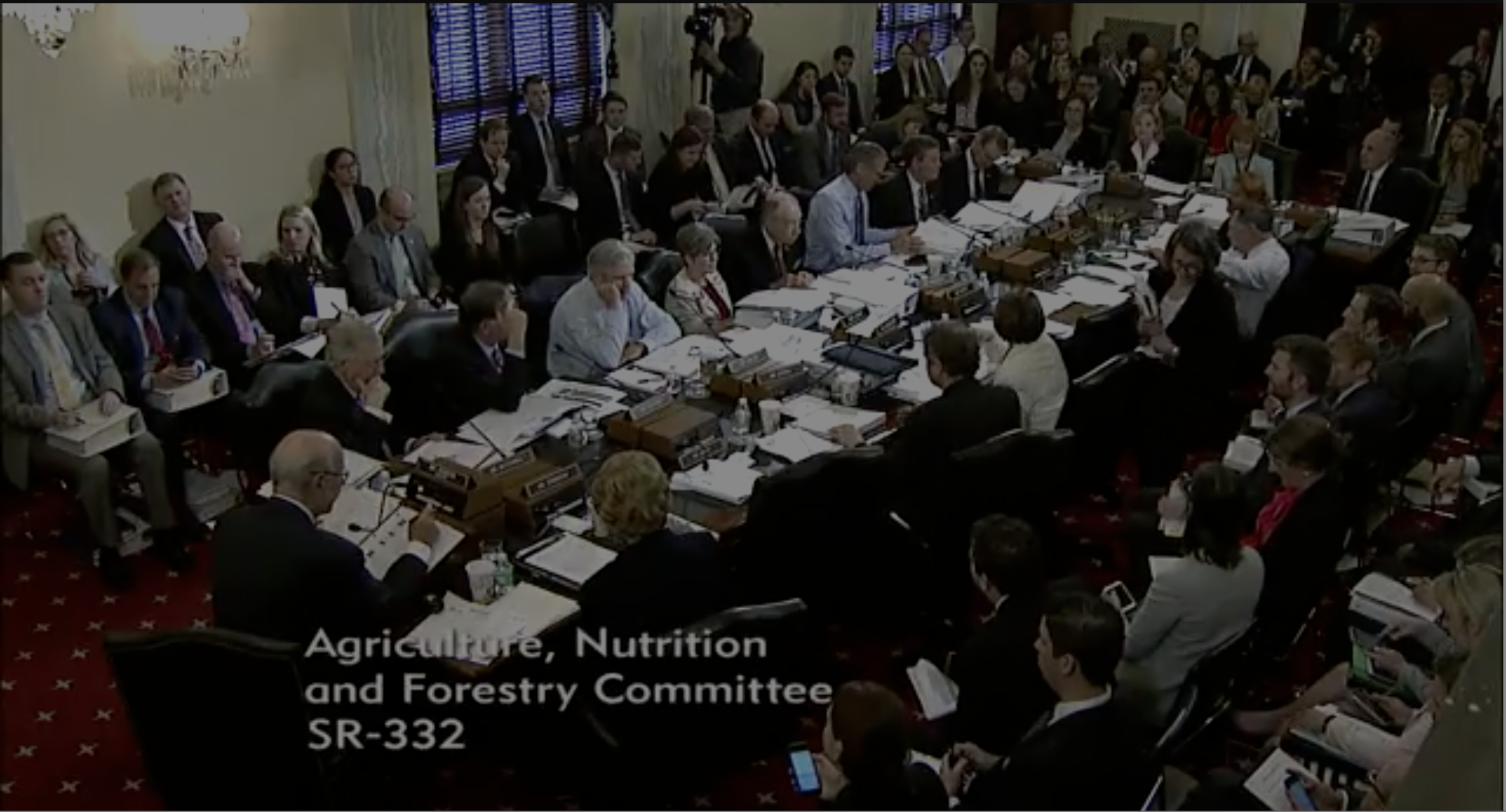Today the Senate Agriculture Committee breezed through its mark up of the Agriculture Improvement Act of 2018 and sent the draft farm bill to the full Senate on a vote of 20-1 (Senator Chuck Grassley, R-IA, voted “no”). The committee voted through a slate of amendments to the draft text released late last week.
Dozens of amendments were incorporated into a “manager’s amendment” and voted through en bloc. Stay tuned for FBLE’s analysis of these changes in the coming days. Next, Senators had an opportunity to bring individual amendments before the Committee for a voice vote. What follows is a rundown of amendments adopted (or not) during this process that affect FBLE’s priorities and recommendations.
Loan Limit Increases Help the Biggest Get Bigger
The Committee adopted an amendment introduced by Senator John Hoeven (R-ND)–and itself amended by Amy Blobuchar (D-MN)–that would dramatically increase loan limits for key USDA credit programs. FSA Guaranteed Farm Ownership and Operating Loan limits would rise from $1.39 million to $1.75 million, while caps on FSA Direct Ownership and Direct Operating loans would change from $300,000 to $600,000 and $400,000, respectively.
The high start-up costs associated with farming present a barrier to entry that disproportionately affects socially disadvantaged farmers and ranchers (SDFR) and beginning farmers and ranchers (BFR). To ensure these groups have a chance of overcoming economic obstacles, FBLE’s report, Diversified Agricultural Economies, recommends several avenues through which Congress can expand access to credit for SDFR and BFR. Direct ownership loans help farmers buy their own farms and are subject to target participation rates that set aside a percentage of funds for SDFR and BRF. Because these funds are targeted at critical populations, and in response to the dramatic rise in land prices, FBLE supports increasing the maximum loan amount for direct ownership loans.
Unfortunately, the picture is far less rosy when it comes to guaranteed loans. Increasing these loan limits caters to larger operations and hurts smaller-scale operators. Allowing individual borrowers to borrow more crowds out and reduces access to credit for SDFR and BFR.
There is a final bright spot. Klobuchar’s amendment-to-the-amendment would increase public access to data on borrowers and participation rates. Given the USDA’s history of discrimination in lending practices, FBLE has identified the release of this information as a critical step toward securing the equitable treatment of loan applicants.
Missed Opportunity for Grassley Amendment
Late changes to procedural requirements prevented Senator Chuck Grassley (R-IA) from getting a vote on his amendment to close the “actively engaged” loophole in commodity program payments.
Grassley’s amendment, which embraces key FBLE recommendations, would limit the number of people per farm who can receive farm program payments. Without this change, the “active personal management” standard remains toothless in limiting the number of people per farm who qualify for Title I subsidies. Although Senator Grassley may be able to offer the amendment on the Senate floor, but he may now need 60 votes to get it into the final farm bill.
Door Opened for Sodsaver Expansion, at States’ Discretion
An amendment from Senators Klobuchar (D-MN) and John Thune (R-SD) lays the groundwork to expand protection of native prairies through a conservation program known as “Sodsaver.” Sodsaver makes eligibility for crop insurance subsidies contingent on protection of native prairies, but under existing law these requirements only apply to six states in the Prairie Pothole Region (Iowa, Minnesota, Montana, Nebraska, North Dakota, and South Dakota). Under the terms of the amendment adopted by the Committee, other states can opt into the program but are not required to do so.
FBLE is concerned that new states will not opt into Sodsaver voluntarily, and believes that farmers in all states should be required to play by the same rules when it comes to meeting critical conservation challenges.

HLS Food Law and Policy Clinic summer interns Kyla Kaplan, Amy Radding Hoover, and Tess Pocock track the Senate Farm Bill markup on Wednesday morning.
Biogas Receives Support
An amendment from Senator Bennet (D-CO) would support efforts to develop the biogas industry. Biogas is produced in great quantities by animal feeding operations, and contributes to local air quality problems and climate change. Alternatively, those gases can be captured and used to generate electricity. The amendment provides funding for competitive grants to develop cost-effective methods for aggregating organic waste from multiple sources into consolidated biogas systems and to address barriers to carbon utilization.
FBLE’s report, Productivity and Risk Management, identified biogas generation as a key opportunity for producers to dispose of manure, reduce emissions, produce useful products, and generate energy for onsite use. Because small and midsize producers face barriers in implementing costly digesters, FBLE recommends that the 2018 Farm Bill create a pilot project to help small and midsize producers develop cooperatively owned biogas generation.
The Bennet amendment grant program is a useful step towards making biogas generation feasible for smaller operations that cannot afford to build a facility on their own. However, FBLE supports the further step of including cooperative biogas production as an eligible technology under existing biorefinery, renewable chemical and biobased product manufacturing assistance programs.



[…] does not limit commodity payments to high income farmers and ranchers. This was referred to as the Grassley amendment in the Senate version of the Farm Bill. The 2018 Farm Bill maintains the current adjusted gross […]